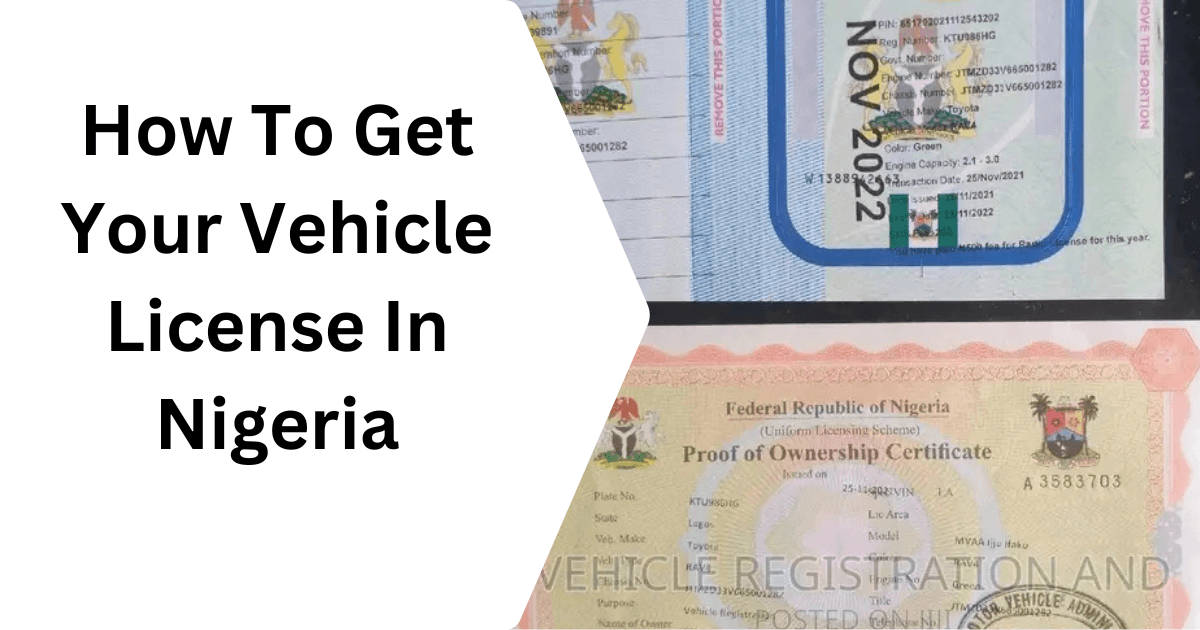You definitely don’t want to have problems with the Nigerian police or the FRSC when you’re stopped at a traffic checkpoint. If you don’t have the right papers, it could lead to your vehicle being seized, getting fined, or even being arrested. As a driver, there are some important documents you must always have with you while driving. These documents will keep you out of trouble and help you avoid penalties. In this article, we’ll go over the 6 important vehicle documents every driver must have to stay safe and avoid issues on the road.
Driver’s License
A valid Driver’s License is the most important document every driver must have. It serves as proof that you are legally allowed to drive on the road after meeting the requirements. Without a valid license, you risk being fined, having your vehicle impounded, or even facing legal consequences. The driver’s license shows that you have passed both the driving test and road safety education, which are critical for responsible driving.
To get a driver’s license, you need to follow the correct steps. This includes attending an approved driving school, passing a driving test, and submitting the necessary documents to the Federal Road Safety Corps (FRSC). It’s important to make sure your license is always valid because driving with an expired one is treated the same as driving without one. Regularly renewing your license helps keep it valid and officially recognized.
Beyond legality, a driver’s license also serves as an identification document in many situations, such as during random checks by the police or FRSC. Carrying it with you at all times while driving is crucial, as failing to present it during a stop can lead to penalties. Having your driver’s license on hand helps avoid unnecessary delays, fines, or confrontations with law enforcement.
Proof of Ownership
Proof of Ownership is a key document that shows you are the legal owner of the car you are driving. It proves that you bought the car legally, whether it’s brand new or used. This document is given to you when you register your car, and it helps avoid confusion or claims that the car is stolen.
Having your proof of ownership with you can save you from trouble during traffic stops. If the police or road safety officers ask for it, you need to show this document to prove the car is yours or that you are allowed to drive it. Without it, they might suspect the car is stolen, which can lead to fines, your car being taken away causing stress and delays.
Also, proof of ownership is important if you decide to sell your car or give it to someone else. It makes the process easy and ensures the new owner can register the car without problems. Keeping this document with you ensures you avoid issues on the road and stay on the right side of the law.
Vehicle Registration
Vehicle Registration is a document that officially links your car to you, making it legal to drive on the road. When you register your vehicle, the government recognizes it as being properly documented and roadworthy. This registration comes with a unique number plate, which helps authorities identify your car. Driving without a valid registration can lead to fines, penalties, or even having your car seized by law enforcement.
It’s important to keep your vehicle registration up to date. Vehicle registrations must be renewed regularly, and failing to renew it can cause issues. If you’re caught driving with an expired registration, you could face serious penalties, including fines or having your vehicle impounded. Keeping your registration current not only ensures you stay on the right side of the law but also helps you avoid unnecessary problems.
Vehicle registration is also important if you’re buying or selling a car. It confirms the car is legally yours and helps transfer ownership easily when you sell it. Whether you’re driving or selling your vehicle, keeping your registration document with you ensures smooth transactions and hassle-free driving.
Vehicle Identification Number (VIN) Certificate
The Vehicle Identification Number (VIN) Certificate is a document that contains a unique code assigned to every vehicle, acting as the vehicle’s fingerprint. The VIN helps identify your car for various purposes, such as registration, insurance, and in the case of theft or recovery. Having a VIN Certificate ensures your vehicle is properly documented and traceable, which is essential for legal and safety reasons. Without it, your car may not be easily identifiable, which could cause problems during law enforcement checks or if the vehicle is stolen.
The VIN Certificate is important during vehicle registration and when obtaining insurance. It provides specific details about the car, including its make, model, year, and country of origin. It also helps verify the car’s authenticity, which is especially important when buying or selling used cars to avoid purchasing a stolen or illegally modified vehicle.
Additionally, a VIN Certificate makes it easier for authorities to track your vehicle in case of accidents, theft, or disputes over ownership.
Customs Papers (for Imported Vehicles)
Customs Papers are essential documents for any imported vehicle in Nigeria. They serve as proof that the required customs duties and taxes have been paid to bring the vehicle into the country legally. Without these papers, the vehicle is considered smuggled or illegally imported, which can lead to severe penalties by customs officers or other law enforcement agencies.
When driving an imported car in Nigeria, having the customs papers readily available is crucial. These documents confirm that all import procedures were followed and that the car was lawfully cleared at the port. During traffic stops or inspections by the Nigerian police or FRSC, customs papers are often requested to verify the legitimacy of the vehicle.
Certificate of Roadworthiness
The Certificate of Roadworthiness is a crucial document that proves your vehicle is safe to drive on the road. Issued after a thorough inspection by authorized government agencies, this certificate confirms that your car meets the necessary safety and mechanical standards. It is required by law to ensure that vehicles on the road are in good condition, reducing the risk of accidents caused by faulty or unfit vehicles.
The Certificate of Roadworthiness must be renewed annually, especially for commercial vehicles. Having it proves that your vehicle has passed safety checks, including brake systems, lights, tires, and other essential components, making you compliant with road safety regulations.
This document is also important when selling a car or renewing your vehicle registration. A valid Certificate of Roadworthiness reassures buyers or authorities that the vehicle is in good working condition.
What to Do If You Lose Any Vehicle Documents
Losing any of your vehicle documents can be stressful, but it’s important to act quickly to avoid complications. The first step is to report the loss to the nearest police station. This will help you obtain a police report, which is often required when applying for replacement documents. A police report serves as official proof that the documents were lost and not intentionally misplaced, which can prevent legal issues down the line.
Next, visit the appropriate government agencies to request replacements. For example, if you’ve lost your driver’s license, head to the nearest Federal Road Safety Corps (FRSC) office to apply for a duplicate. For other documents like vehicle registration or proof of ownership, you’ll need to visit the Vehicle Inspection Office (VIO) or the State Licensing Office. Bring all required information, including the police report and your vehicle’s details, to speed up the process.
It’s also helpful to make digital copies of your documents and store them in a safe place. This way, even if you lose the physical copies, you still have records that can help in getting replacements. Acting swiftly and keeping copies of your vehicle particulars can save you time and prevent legal troubles on the road.
FAQs
1. What are the essential vehicle documents I must always carry?
You should always have your driver’s license, vehicle registration certificate, proof of insurance, roadworthiness certificate, proof of ownership, and a valid emissions test report (if applicable). These documents are required for legal and safety purposes.
2. What happens if I’m caught driving without these documents?
Driving without required documents can result in fines, vehicle impoundment, or even legal charges, depending on the severity of the situation. Always ensure your documents are up-to-date and easily accessible in your vehicle.
3. How can I renew my vehicle documents in Nigeria?
You can renew most vehicle documents, such as your driver’s license and roadworthiness certificate, through the relevant government agencies or authorized service providers. It’s important to start the renewal process early to avoid delays or penalties.
4. How do I keep my vehicle documents safe?
Store your original documents in a secure but accessible location in your vehicle, such as a document holder or glove compartment. You can also keep digital copies on your phone or email for backup in case the originals are lost or damaged.
5. Are digital copies of vehicle documents acceptable?
In some cases, digital copies may be accepted, but it’s always better to have the original documents with you to avoid complications during inspections or checks by traffic authorities.
Carrying the right vehicle documents is not just a legal requirement but also a smart way to protect yourself and your car. Keeping them organized, up-to-date, and easily accessible ensures you’re always prepared for any checks or emergencies on the road.




